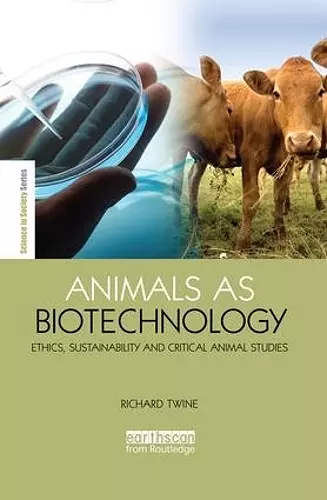Animals as Biotechnology
Ethics, Sustainability and Critical Animal Studies
Format:Paperback
Publisher:Taylor & Francis Ltd
Published:25th Jun '15
Currently unavailable, and unfortunately no date known when it will be back
This paperback is available in another edition too:
- Hardback£170.00(9781844078301)

In Animals as Biotechnology sociologist Richard Twine places the question of human/animal relations at the heart of sustainability and climate change debates. The book is shaped by the emergence of two contradictory trends within our approach to nonhuman animals: the biotechnological turn in animal sciences, which aims to increase the efficiency and profitability of meat and dairy production; and the emerging field of critical animal studies - mostly in the humanities and social sciences - which works to question the nature of our relations with other animals.
The first part of the book focuses on ethics, examining critically the dominant paradigms of bioethics and power relations between human and non-human. The second part considers animal biotechnology and political economy, examining commercialisation and regulation. The final part of the book centres on discussions of sustainability, limits and an examination of the prospects for animal ethics if biotechnology becomes part of the dominant agricultural paradigm. Twine concludes by considering whether growing calls to reduce our consumption of meat/dairy products in the face of climate change threats are in fact complicit with an anthropocentric understanding of sustainability and that what is needed is a more fundamental ethical and political questioning of relations and distinctions between humans, animals and nature.
'Twine's Animals as Biotechnology adds a much needed perspective to debates surrounding animal life, ethics, capitalism, and emerging animal biotechnologies. Combining cutting-edge interdisciplinary frameworks from critical animal studies with in-depth analyses of the economics and science behind the increasing commodification and production of animals for human consumption, Twine makes a compelling case for the development of a more generous, less anthropocentric approach in our myriad relations with the other-than-human world.' – Dr. Matthew Calarco, Associate Professor of Philosophy, California State University at Fullerton, USA - Author of 'Zoographies: The Question of the Animal from Heidegger to Derrida'
'Richard Twine weaves deftly between 'molecularisation' of animals in biotechnology and growing sensibilities about human-animal relationships. Tensions between these opposing strands raise many questions about what animal science can promise, and - importantly - about implications for sustainability and how we treat other animals who share this earth. Rethinking relationships with other animals is critical for all our futures.' – Professor Lynda Birke, University of Chester, UK andauthor of 'Feminism, Animals and Science: The Naming of the Shrew' and 'Feminism and the Biological Body'
'Twine's book is an excellent addition to both bioethics and animal studies. He is able effectively to synthesize and constructively critique two complex disciplines, while at the same time keeping an emphasis on the living animals themselves. This book is essential for anyone working in the fields of animal studies, bioethics, and science and technology studies, as well as for graduate-level courses in these areas' – Dr. Julie Urbanik, Society & Animals
'Its combination of breadth and proficiency with technical developments makes it a valuable resource for those seeking to stay abreast with developments in the field, both ethical and technological. (It) offers a sophisticated analysis of a range of complex technical issues and would be valuable to those teaching and studying bioethics, animal studies or environmental studies, as well as those interested in the intersection of agriculture and political economy' – Jay (Koby) Oppenheim, Food, Culture & Society
'Impressively erudite and impeccably researched, the book marks a major contribution to debates on animal biotechnology, climate change, and critical animal studies. The book triumphantly addresses the critique of the humanities as irrelevant and isolated from practical matters by attending to the hard scientific issues so many scholars in the humanities lack the training to properly engage. Its success is double, then, because more than offering a critique of scientific practices from a posthumanist perspective, for scientists in these fields the book lucidly presents the full scope of the ethical issues that surround their work - and, perhaps more importantly, offers an ethical framework for the future' – Chris Washington, Miami University (Ohio), Journal for Critical Animal Studies
'Undoubtedly, Animals as Biotechnology is an impressive piece of research, the winner of the Institute for Critical Animal Studies 2011 book of the year and a stinging critique of meat production practices' – John Miller, Green Letters
ISBN: 9781138867000
Dimensions: unknown
Weight: 430g
232 pages